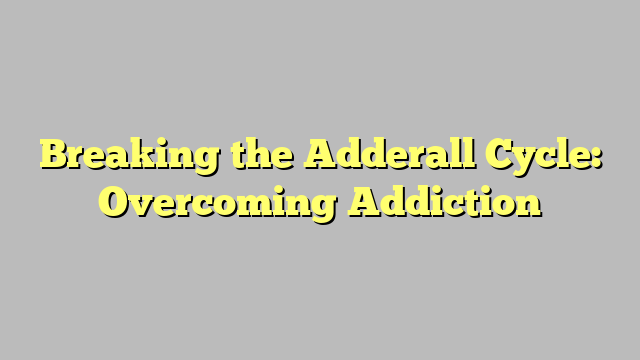In today’s fast-paced society, the use of Adderall has become increasingly prevalent as a way to enhance focus and productivity. However, what starts as a seemingly harmless solution can quickly spiral into a dangerous cycle of addiction for many individuals. Adderall addiction is a serious issue that can have detrimental effects on both physical and mental health, as well as overall well-being. It is crucial to understand the signs of addiction and the steps one can take to break free from this destructive cycle.
Recognizing the Signs
It is crucial to be aware of the signs of adderall addiction. Individuals struggling with this addiction may exhibit noticeable changes in behavior and mood. They might become more secretive, defensive, or irritable, pushing loved ones away in an attempt to conceal their dependence. Physical signs to watch for include increased heart rate, insomnia, and weight loss due to suppressed appetite.
Addiction to adderall can also manifest in cognitive symptoms. One might notice difficulty concentrating, memory problems, or extreme mood swings. Those addicted may prioritize obtaining and using the drug above other responsibilities and activities, leading to neglect of work, school, or relationships. Changes in social interactions and a decline in personal hygiene could also signal a developing addiction.
Recognizing the signs of adderall addiction early on can be challenging, as individuals might be adept at hiding their struggles. However, being observant and maintaining open communication can help in identifying these warning signals. If you notice consistent patterns of behavior that raise concerns, it may be time to seek professional help and intervention.
Seeking Professional Help
When it comes to breaking free from Adderall addiction, seeking professional help is crucial. A qualified healthcare provider or addiction specialist can provide invaluable guidance and support throughout the recovery process. They can offer personalized treatment plans tailored to your specific needs, increasing the chances of successful recovery.
Professional help may involve therapy sessions to address the underlying issues contributing to Adderall addiction. In these sessions, individuals can explore triggers, learn coping mechanisms, and develop healthy strategies to manage cravings and withdrawal symptoms. Therapists can also help individuals build resilience and self-awareness, empowering them to make positive changes in their lives.
In addition to therapy, healthcare providers may recommend medical interventions to support individuals in overcoming Adderall addiction. These interventions can include medication-assisted treatment to help manage withdrawal symptoms and reduce cravings. Working closely with a healthcare provider ensures a comprehensive approach to recovery, addressing both the physical and psychological aspects of addiction.
Rebuilding a Healthy Lifestyle
Once you have taken steps to break free from Adderall addiction, it is important to focus on rebuilding a healthy lifestyle. This involves incorporating positive habits into your daily routine and prioritizing self-care. Regular exercise, nutritious meals, and sufficient rest are key components to promoting physical and mental well-being.
Additionally, seeking support from loved ones or joining a support group can greatly aid in the recovery process. Surrounding yourself with understanding and encouraging individuals can provide the motivation and reassurance needed to stay on track towards a healthier lifestyle. Remember, you are not alone in this journey, and reaching out for help is a sign of strength, not weakness.
Lastly, finding new hobbies or interests can help fill the void left by Adderall addiction. Engaging in activities that bring joy and fulfillment can distract from cravings and negative thoughts. Whether it’s pursuing a passion for art, music, or sports, exploring new avenues can lead to a more enriching and satisfying life beyond addiction.
